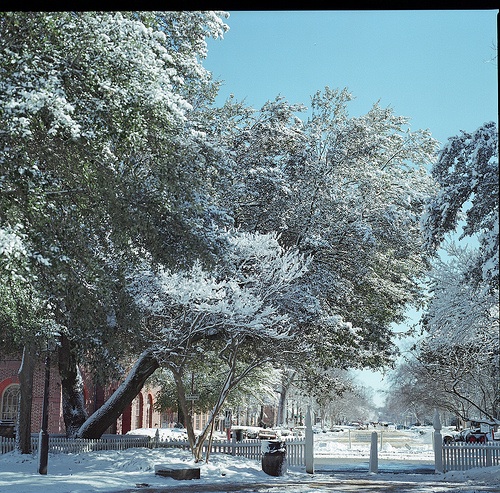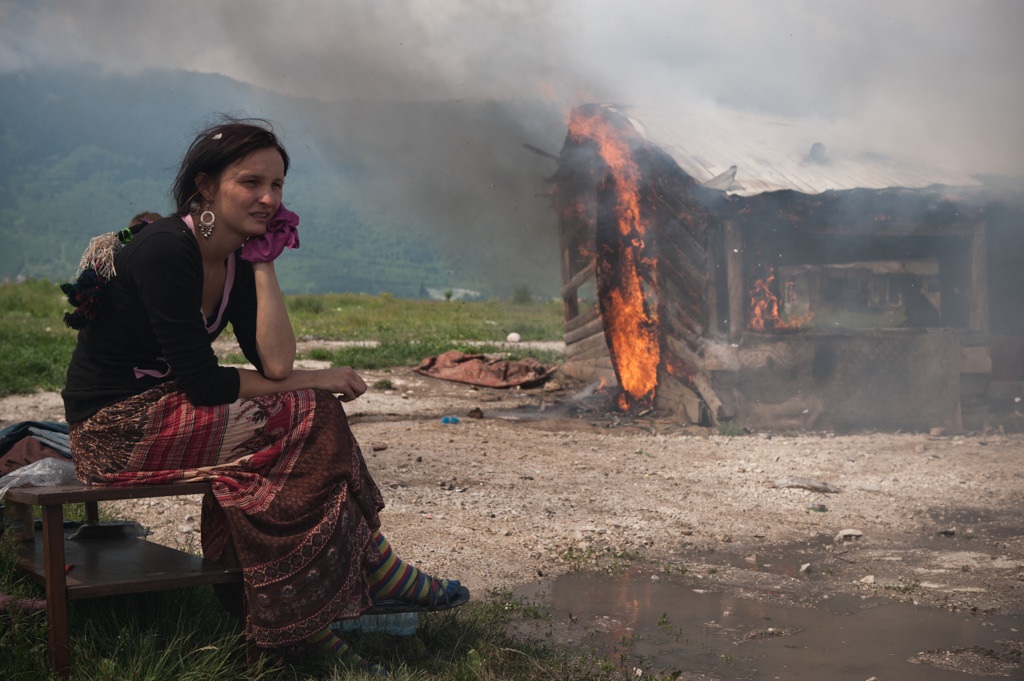
Williamsburg, Va. is a southern city that houses retirees, a transient tourist population, and college students. For years it has been racially and ethnically homogenous, but today its newcomers appear on the main road, where several Hispanic restaurants have opened.
At one such establishment, covered with Aztec-inspired decorations, a salsa beat played and workers in the back kitchen spoke loudly to each other in Spanish. They whispered in rudimentary English while taking orders in front. Sitting in a rear corner during her ten-hour shift, a Mexican woman who asked to be referred to only as Rosa, her middle name, was taking a break.
Rosa, 23, arrived at Williamsburg four years ago. After having a daughter as a single teenage mother in Mexico City, she decided to migrate to the United States to earn money for her family. But even though Williamsburg allows her to send remittances, she explains that she feels as if she is "invisible in this community" since she does not feel part of the society and, in part, because of her constant fear that her illegal status will be discovered.
In New York City or in Washington, DC, Rosa could expect to have the support of a large community of fellow immigrants; or at least accessible public transportation and a more ethnically mixed area in which she is not marked as an outsider. But in Williamsburg, she says, she is trapped – part of a growing number of isolated immigrants who have settled in what is known among recent arrivals as "el Nuevo South".
Since 1990, the number of Hispanic immigrants living in "el Nuevo South" – southern American cities and suburbs located in Virginia, North Carolina and Georgia –has multiplied. In Williamsburg, for instance, the Latin population has tripled.
While some advocates say these areas offer important benefits to Hispanic immigrants over traditional destinations – less crime, for example, and more economic opportunities – others say they also present new difficulties for Latinos.
These "places had never experienced immigration before and now they have to deal with it," says sociology Professor Deenesh Sohoni from the College of William and Mary. "A lot of the services have become dependent on immigrant labor and immigrants are filling in the niche. This trend is similar to other areas but the major difference is that these [cities or towns] are small and not used to the new population."
Latinos often face discrimination, according to social workers that help Latinos in Williamsburg. They also struggle with isolation due to a lack of public transportation, absence of translation resources, shortage of public services, and exacerbated vigilance towards the undocumented population.
"What you have in small towns is old time racism, people are xenophobic," says Susheela Varky, domestic abuse attorney in the Virginia Poverty Law Center. "There is a sense that others are here to take our jobs".
Gabriela, an undocumented Salvadorian waitress at a Mexican restaurant, says she encounters discrimination in her everyday life.
"There are racist people, they look at you in a certain way or they complain of the music even though it is a Hispanic restaurant," she says. "We get annoyed but what are we going to do? It's their country, we just smile."
Economic changes have fueled Latino immigration. Williamsburg has developed a popular tourism market and has become a place of residence for wealthy elders in the past twenty years. Consequently, its construction, restaurant, and hotel industries have developed, which in turn has attracted immigrant workers.
This is why Enrique, a young Mexican construction worker, resettled here.
"I used to live in Washington but I was fired," he said. "And then my brother called to tell me that we needed to move to Virginia because our friend had a construction job for us. So I packed my bags and I came here."
But as with other parts of the country, jobs going to typically lower-paid immigrant workers can raise hackles among longtime residents, say those who have worked with migrants here.
Long-time residents of local communities complain that these new residents use too many public services, increase crime rates, and refuse to adapt to American culture. As the Latin population grows more visible, so does anti-immigrant sentiment and more restrictive government policies, say scholars.
In Williamsburg, many Hispanics are asked for their documents without any justification. As one undocumented Latina explains: "I went to a [night] club and I showed the bouncer my passport. He asked for my visa and I told him I didn't have it on me and he said he couldn't let me in. I got upset. It was the last time I went out in Williamsburg." Her cousin faced a similar experience when he was not allowed to buy liquor for a party, she says.
In 2007, the Williamsburg City Council discussed passing an ordinance to diminish illegal immigrants' use of social services and to allow local police to check documentation in misdemeanors. Similarly, arrests of Latinos became increasingly publicized, depicting the community as a criminal one. Hispanics' fear of being subject to discrimination rose sharply. However, the council did not pass the regulation due to its high economic cost.
Varky predicts that if restrictive policies are enacted in the future, immigrant domestic violence victims will become increasingly endangered.
"If local law enforcers check my clients' documents then they won't call the police. This means that 1. The perpetrators are not being punished, 2. She will not call the police and is at higher risk of being killed by the abuser, 3. If she is deported there is no one there to take care of the children," she says.
Indeed, scholars say that Williamsburg and other cities and suburbs of "el Nuevo South" can be particularly difficult for women. Latinas are blamed for using public resources since they are often in the highly visible role of seeking education, healthcare, food stamps, and other services especially if they have American-born children.
Williamsburg natives accuse undocumented women of abusing these resources, even though they are routinely blocked from receiving assistance because they are unable to identify themselves with a social security number.
At the same time, Latinas' poor language skills discourage them from seeking services. Adrienne Frank, a Director of Child Development Resources, explains that female immigrants in Williamsburg need food, clothing, housing, and transportation, but they differ from other poor women because they suffer from a "lack of communication to address their own needs, a lack of understanding of how things work, a reluctance to advocate for themselves, and isolation due to fear and inability to communicate".
Isabel, a Salvadorian immigrant, says this was her experience when she tried to acquire food stamps.
"I walked in and the receptionist said nothing, she just gave me a sheet of paper that I needed to fill out," she says. "It was in English so I just stared at it and I was so frustrated that I grabbed the paper and walked out of the place."
Limited public transportation intensifies the isolation of many Latinas such as Gabriela.
"It is hard not to have a car because I can't go out in Williamsburg," she says.
She lives in walking distance to her job, but cannot visit other parts of the city.
Williamsburg is spread out geographically and its few bus lines run sporadically. Most women cannot afford a private vehicle and those who can but are undocumented are at constant risk of being stopped.
Rosa underwent this experience: "I recently had a problem because I did not have a license while I was driving, I told the truth in court [revealing her illegal status] and they asked me what I was doing here (…) For weeks I was afraid that the police would show up to deport me, but no one came".
The possibility that women will be asked to show their documents impacts their participation in social activities outside the home.
"We do not go to many places due to the fear that they ask for" citizenship papers, says Gabriella.
This fear can lead immigrants to do little or nothing to find better jobs creating economic immobility: as another undocumented Latina states:
"I have never worked in anything else because I am afraid that they will ask for my documents."




